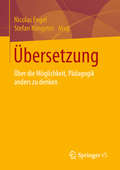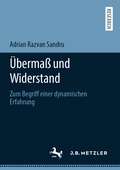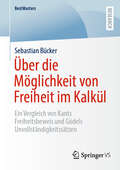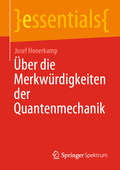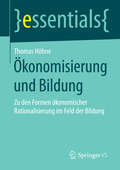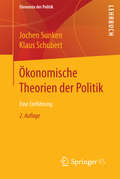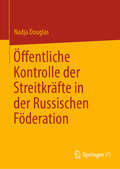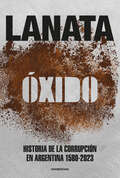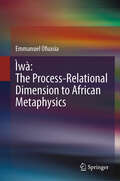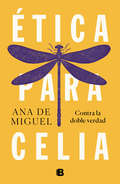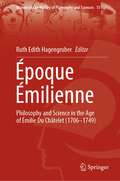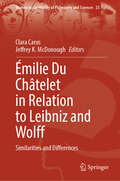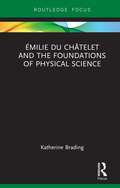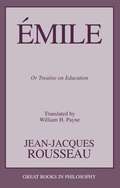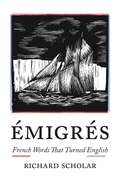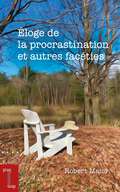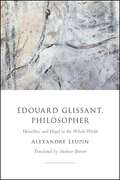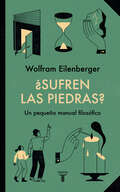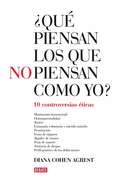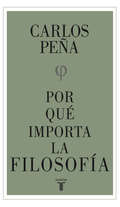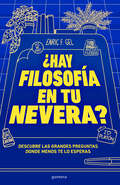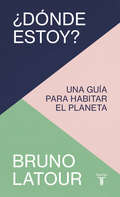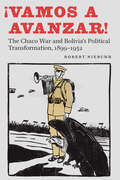- Table View
- List View
Übersetzung: Über die Möglichkeit, Pädagogik anders zu denken
by Nicolas Engel Stefan KöngeterIn diesem Band wird mittels des Übersetzungsbegriffs die Möglichkeit verhandelt, Pädagogik anders zu denken. Sozial- und kulturwissenschaftliche Übersetzungstheorien werden dabei genutzt, um die theoretische Produktivität von Übersetzung für die Pädagogik auszuloten: Als Topos pädagogischer Theoriebildung lassen sich mit Übersetzung Verhandlungen über die Bedeutung von Anderem und Anderen und über die Geltung von pädagogischem Wissen im Horizont eines möglichen oder zukünftigen Anders-Sein thematisieren. Ein pädagogischer Einsatz des Übersetzungsbegriffs verspricht zudem mögliche Antworten auf die Frage nach dem Wie der Vermittlung von Bedeutung und Wissen.Die Beiträge zielen dementsprechend im ersten Teil des Bandes darauf, Übersetzung als begriffliche Kategorie pädagogischer Theoriebildung zu entwerfen. In einem zweiten Teil wird Übersetzung als Analysekategorie der Begegnung kultureller Lebensformen und Ordnungen eingesetzt. Schließlich fokussiert der dritte Teil Formen der pädagogischen Theorieproduktion und erziehungswissenschaftlichen Wissensarbeit im transnationalen bzw. globalen Kontext.
Übermaß und Widerstand: Zum Begriff einer dynamischen Erfahrung
by Adrian Razvan Sandru„Übermaß und Widerstand“ ist ein systematischer Versuch, eine Brücke zwischen der transzendentalen Philosophie Kants und der Gegebenheitsphänomenologie Jean-Luc Marions zu spannen, wobei der Ansatz einer dynamischen Konstitution der Erfahrung vertreten wird, in welcher sich die kognitiven Strukturen des Subjektes im Dialog mit erlebten Phänomenen an ihre Auffassungsmöglichkeiten anpassen. Damit ist die Beschreibung einer dialogisch-dynamischen Erfahrung beabsichtigt, welche die hermeneutischen und spontanen Leistungen des Subjektes anerkennt sowie Raum für eine Autonomie phänomenaler Manifestierung macht, d.h., dass die Phänomene die Bedingungen ihrer eigene Auffassung durch ein erkennendes und reflektierendes Subjekt mitgestalten. Dementsprechend wird hier der Fokus auf ein Subjekt gelegt, welches hauptsächlich reflektierend tätig ist und dabei an sich arbeitet – d.h. an seinem erkennenden Vermögen, um sich einem breiten Spektrum phänomenaler Möglichkeiten aussetzen zu können. Dieser Ansatz wird daher für eine aktive Passivität des Subjektes argumentieren, wobei die Empfänglichkeit des Subjektes mit seinen Fähigkeiten zur Reflexion eng zusammenhängt.
Über die Möglichkeit von Freiheit im Kalkül: Ein Vergleich von Kants Freiheitsbeweis und Gödels Unvollständigkeitssätzen (BestMasters)
by Sebastian BückerDie Frage nach den Denkfähigkeiten von Maschinen beschäftigt die Menschheit, seit Turing 1950 diese Frage das erste Mal aufwarf. Um das Verhältnis menschlicher und maschineller Denkfähigkeit zu beleuchten, werden in diesem Buch die Argumentationsmodi von Kants Freiheitsbeweis und Gödels Unvollständigkeitssätzen verglichen und aufgezeigt, inwiefern beide Beweise eine analoge inferentielle Struktur aufweisen. So kann auf Probleme der Selbstreferenzialität aufmerksam gemacht werden, die sich insbesondere dann ergeben, wenn Anerkennungsverhältnisse von Maschinen gedacht werden sollen.
Über die Merkwürdigkeiten der Quantenmechanik (essentials)
by Josef HonerkampDie Quantenmechanik ist eine physikalische Theorie für Objekte des Mikrokosmos, also z.B. für Atome oder Elektronen. Sie hat sich bisher bestens bewährt, führt aber dazu, dass wir diesen Objekten Eigenschaften und Relationen zubilligen müssen, die weder mit unserem gesunden Menschenverstand noch mit den Begriffen der klassischen Physik vereinbar sind. Diese Merkwürdigkeiten werden vorgestellt und ihre Bedeutung für unser Erkenntnisvermögen und für ein Weltbild wird diskutiert.
Ökonomisierung und Bildung: Zu den Formen ökonomischer Rationalisierung im Feld der Bildung (essentials)
by Thomas HöhneÖkonomisierung als Rationalisierung im Arbeits- und Produktionsbereich stellt ein kapitalistisches Grundprinzip dar, das seit den 1980er Jahren zunehmend auf außerökonomische Bereiche übertragen wird. Vorangetrieben wird diese Entwicklung national sowie international vor allem durch Staat, Politik und transnationale Akteure, die zunehmend ökonomische Steuerungsmittel wie Evaluation und Indikatorensteuerung in den Bildungsbereich einführen. Primäres Ziel ist es, Wettbewerb systematisch im Bildungssystem als Entwicklungsinstrument zu etablieren. Hierdurch sollen marktähnliche Strukturen - sogenannte Quasi-Märkte - geschaffen werden, deren bildungsökonomisches Ziel insgesamt eine nachhaltige Steigerung der gesamtgesellschaftlichen Produktivität von Bildung ist.
Ökonomische Theorien der Politik
by Klaus Schubert Jochen SunkenÖkonomische Theorien der Politik verwenden das theoretische und methodische Instrumentarium der Wirtschaftswissenschaften für die Analyse von politischen Strukturen, Prozessen und Inhalten. Da der ökonomische Ansatz der Politik eine immer größer werdende Rolle in der Politikwissenschaft spielt, werden in dieser Einführung die grundlegenden Begriffe und Theorien in verständlicher Form dargestellt. Ziel ist es, einen ersten Überblick über Denkweise, Logik und Mehrwert ökonomischer Theorien der Politik zu geben.
Öffentliche Kontrolle der Streitkräfte in der Russischen Föderation
by Nadja DouglasDer Band befasst sich mit den Grundlagen der gegenwärtigen Beziehungen zwischen zivilen Akteuren und staatlichen Machtstrukturen. Der Schwerpunkt liegt auf dem Themenfeld der öffentlichen Kontrolle von Streitkräften und der Frage, warum zivile Akteure ein wachsames Auge auf die militärische Institution sowie zivile Behörden, die den Einsatz von Gewalt legitimieren, haben sollten. Am Beispiel von Wehrpflicht und Rekrutierung als Schnittstelle zwischen Militär und Gesellschaft analysiert die Studie den institutionellen Wandel im politisch-militärischen Bereich im postsowjetischen Russland. In kritischer Auseinandersetzung mit der konventionellen Militärsoziologie verlagert das Buch den Fokus weg von der exklusiven Machtbeziehung zwischen politischen und militärischen Eliten im Kontext der nationalen Sicherheit. Stattdessen berücksichtigt es die menschliche und gesellschaftliche Sicherheit, d.h. die Bedürfnisse und Forderungen von Individuen und Gruppen an der Basis, die vom Militär und der herrschenden Sicherheitslage in Russland betroffen sind. Das Buch richtet sich an Leser mit Interesse an zivil-militärischen Beziehungen, gegenwärtiger russischer Gesellschaftspolitik und Theorien sozialer Bewegungen.
Óxido: Historia de la corrupción en Argentina 1580-2023
by Jorge LanataUna investigación integral, histórica y periodística de la corrupción argentina a través de cinco siglos: del Virreinato al Olivosgate, Jorge Lanata recorre este proceso imparable de descomposición nacional y lo ilumina a través de una selección sorprendente de casos tanto poco conocidos como notables. Argentina está oxidada. La corrupción es su óxido. Y se extiende cada vez más sobre el país. Creemos verlo, creemos que está a la vista de todos. Pero, según los últimos estudios, solo el 12% de los hechos de corrupción conocidos llegan a la Justicia y solo el 2% recibe algún tipo de condena. Con el correr de los años, la corrupción ha ido cambiando, expandiéndose, perfeccionándose, poniéndose al abrigo de la impunidad. Aunque algo se mantuvo invariable: el rol del Estado. El inventor de la barrera siempre cobró peaje. En esta investigación histórica y periodística, Jorge Lanata recorre este proceso imparable de descomposición nacional y lo ilumina a través de una selección sorprendente de casos tanto poco conocidos como notables, que arrancan cuando Argentina no era todavía una república y llegan hasta hoy, cuando se pregunta si puede volver a serlo. Una radiografía descarnada para contar un país que -de forma deliberada, por omisión o negligencia- ha construido un sistema funcional al fraude, la malversación, la usurpación, el tráfico de influencias y el robo liso y llano. Un sistema en el que es casi imposible investigar y cuando se investiga, no se sanciona. En el que nunca hay funcionarios inocentes ni culpables, sino tan solo sospechosos. Una herrumbre que nos corroe desde siempre y se expande frente a nuestros ojos.
Ìwà: The Process-Relational Dimension to African Metaphysics
by Emmanuel OfuasiaThis book approaches the subject of African metaphysics historically as it connects Ancient Egypt to Yorùbá. It provides a history of African metaphysics from ancient Egypt or Kemet down to John Boakye Danquah and Placide Tempels in the 20th century and then Innocent Asouzu, Ada Agada, and Aribiah David Attoe, in the 21st century. As it surpasses the deductions of these previous works, it moves further to showcase African originality and approaches to studying reality, whilst resisting the temptation to deduce conclusions from Western philosophy. It is the first book in the history of African philosophy to use a process-relational approach to interrogate African metaphysics. It also serves to harmonize and engage prominent African scholars who have written on the subject of African metaphysics. The general scope of this book centers on engaging the history of distortion and misunderstanding of African metaphysics by providing a relevant and reliable process-relational background as well as an alternative trivalent logic system. Unless African metaphysical theories are understood from this perspective, they will remain powerless to overcome these misrepresentations. It appeals to students and researchers internationally actively working in the fields of African philosophy, Intercultural African studies as well as process studies. ______________________________ “This book is one of the valuable contributions to the emerging field of African philosophy, after decades (1970s–1990s) of rather fruitless debates on the status of the discipline. Like many others, the book side-tracks the seemingly unending controversy of whether or not there is such a thing as African philosophy.” – Godwin Sogolo, Emerittus Professor of Philosophy, National Open University of Nigeria (NOUN). “In the opening lines of the introduction of this monumental book, Dr. Ofuasia announces: “As you read these lines, the earth in which you live in, as an ontological entity is spinning at an estimate estimated speed of 67, 000 mph. This indicates that the perspective that a thing is not in motion or is at rest is one of the fallacies ever fed to humanity. Nothing rests!” I was awe struck by how this revelation from physics extends to metaphysics. This book is a welcoming addition to African metaphysical scholarship as the process-relational approach used to explore Egyptian and ancient Yorùbá thought system in this work creatively intersects emerging discourses on agency both at the animate and what humans call inanimate, ontology, plant sentience, African medicine, cosmogony, the physical sciences, neutral nihilism and other related metaphysical topics. The eclectic interrogation of classical concepts of Ìwà and Nun from the Yoruba and Egyptian intellectual traditions, respectively, is a trail-blazing contribution. Congratulations on this feat, Dr Ofuasia!” – Ademola Kazeem Fayemi, Queensland Bioethics Center, Australian Catholic University, Brisbane. “Dr Ofuasia’s book marries aspects of Egyptian philosophy with ancient Yorùbá metaphysics and process metaphysics, all under the framework of Ezumezu logic, and it works. What has emerged from this marriage is a new and contemporary theory in African metaphysics – Ìwà ontology which is strongly grounded on African thought. This book is recommended for anyone interested in (African) metaphysics.” Aribiah David Attoe, University of the Witwatersrand. “Emmanuel Ofuasia’s text is engaged, at times even - rightfully - angry. This makes this a lively, energetic contribution. I appreciate that. This passion is often missing in philosophy, but it is much needed, especially in this area of research.” – Bjoerne Freter, Hagerstown Community College, Maryland. “In this timely work, Emmanuel Ofuasia throws down a challenge to African philosophers with the claim that process th
Ética para Celia
by Ana De MiguelEste libro no es solo una ética para chicas, es también una llamada a los chicos para que se atrevan a transgredir de verdad: para que dejen de ponerse en el lugar de sus deseos y se pongan en el lugar de las demás. La filosofía nos enseña que lo importante son las preguntas que nos hacemos, siempre que formulemos bien nuestros interrogantes y nos preguntemos por el fundamento de nuestros proyectos. La ética, por su parte es una invitación a ponerse en el lugar de los demás, y sucede que hasta ahora los hombres no se han puesto en el lugar de las mujeres. Con ellas ha valido casi todo: desde borrar su nombre y su historia hasta la violencia sexual. La filosofía y, con ella, la ética puede ayudarnos a comprender las enormes contradicciones a las que tienen que enfrentarse las mujeres en un mundo patriarcal al que los filósofos, aun sin haber estado a la altura, sí aportaron una manera de pensar crítica que nos ha llevado a ser conscientes de las desigualdades y a cuestionar el sistema. Ética para Celia nos invita a mirar de frente la realidad, el hecho de que nuestra vida se ha levantado sobre una doble verdad, con normas morales y fines vitales distintos para mujeres y hombres. Esta doble verdad se ha ido transformando, pero no ha desaparecido. A las jóvenes ya no se las socializa con idea de que sean para los demás, pero sí para ser deseables, que no deja de ser otra forma de ser para los otros.
Époque Émilienne: Philosophy and Science in the Age of Émilie Du Châtelet (1706-1749) (Women in the History of Philosophy and Sciences #11)
by Ruth Edith HagengruberThe present book contextualizes Du Châtelet’s contribution to the philosophy of her time. The editor offers this tribute to an Époque Émiliennee as a collection of innovative papers on Emilie Du Châtelet’s powerful philosophy and legacy.Du Châtelet was an outstanding figure in the era she lived in. Her work and achievements were unique, though not an exception in the 18th century, which did not lack outstanding women. Her personal intellectual education, her scholarly network and her mental acumen were celebrated in her time, perceiving her to have “multiplied nine figures by nine figures in her head”. She was able to gain access to institutions which were normally denied to women. To call an epoch an Époque Émilienne may be seen as daring and audacious, but it will not be the last time if we continue to bring women philosophers back into the memory of the history of philosophy. The contributors paid attention to the philosophical state of the art, which forms the background to Du Châtelet’s philosophy. They follow the transformation of philosophical concepts under her pen and retrace the impact of her ideas. The book is of interest to scholars working in the history of philosophy as well as in gender studies. It is of special interest for scholars working on the 18th century, Kant, Leibniz, Wolff, Newton and the European Enlightenment.
Émilie Du Châtelet in Relation to Leibniz and Wolff: Similarities and Differences (Women in the History of Philosophy and Sciences #23)
by Jeffrey K. McDonough Clara CarusThis book offers the first detailed comparison between Émilie Du Châtelet's philosophy and her predecessors G.W. Leibniz and Christian Wolff. It highlights the similarities and the differences between her work and the ideas of Leibniz and Wolff. The book's chapters explore a wide range of key concepts and topics, including freedom, love, space, extension, certainty, probability, the continuum, time, eternity, the world apart doctrine, and the principle of sufficient reason. The book as a whole situates Du Châtelet’s thought in the context of her predecessors and highlights how Du Châtelet’s understanding of her sources laid the foundations for the development of her own ideas. This edition will be of crucial interest to the growing community of scholars working on Du Châtelet’s thought as well as scholars of Early Modern Philosophy more generally.
Émilie Du Châtelet and the Foundations of Physical Science (Routledge Focus on Philosophy)
by Katherine BradingThe centerpiece of Émilie Du Châtelet’s philosophy of science is her Foundations of Physics, first published in 1740. The Foundations contains epistemology, metaphysics, methodology, mechanics, and physics, including such pressing issues of the time as whether there are atoms, the appropriate roles of God and of hypotheses in scientific theorizing, how (if at all) bodies are capable of acting on one another, and whether gravity is an action-at-a-distance force. Du Châtelet sought to resolve these issues within a single philosophical framework that builds on her critique and appraisal of all the leading alternatives (Cartesian, Newtonian, Leibnizian, and so forth) of the period. The text is remarkable for being the first to attempt such a synthetic project, and even more so for the accessibility and clarity of the writing. This book argues that Du Châtelet put her finger on the central problems that lay at the intersection of physics and metaphysics at the time, and tackled them drawing on the most up-to-date resources available. It will be a useful source for students and scholars interested in the history and philosophy of science, and in the impact of women philosophers in the early modern period.
Émile Or Treatise on Education
by Jean-Jacques Rousseau William H. PayneIn his pioneering treatise on education the great French philosopher presented concepts that had a significant influence on the development of pedagogy, and yet many of his ideas still sound radical today. Written in reaction to the stultifying system of rote learning and memorization prevalent throughout Europe in Rousseau's time, Émile is a utopian vision of child-centered education, full of the sentiments of Romanticism, which Rousseau himself inspired. Educators as well as students of philosophy will find much to admire in Rousseau's original and still radical ideas.
Émigrés: French Words That Turned English
by Richard ScholarThe fascinating history of French words that have entered the English language and the fertile but fraught relationship between English- and French-speaking cultures across the world.English has borrowed more words from French than from any other modern foreign language. French words and phrases—such as à la mode, ennui, naïveté and caprice—lend English a certain je-ne-sais-quoi that would otherwise elude the language. Richard Scholar examines the continuing history of untranslated French words in English and asks what these words reveal about the fertile but fraught relationship that England and France have long shared and that now entangles English- and French-speaking cultures all over the world.Émigrés demonstrates that French borrowings have, over the centuries, “turned” English in more ways than one. From the seventeenth-century polymath John Evelyn’s complaint that English lacks “words that do so fully express” the French ennui and naïveté, to George W. Bush’s purported claim that “the French don’t have a word for entrepreneur,” this unique history of English argues that French words have offered more than the mere seasoning of the occasional mot juste. They have established themselves as “creolizing keywords” that both connect English speakers to—and separate them from—French. Moving from the realms of opera to ice cream, the book shows how migrant French words are never the same again for having ventured abroad, and how they complete English by reminding us that it is fundamentally incomplete.At a moment of resurgent nationalism in the English-speaking world, Émigrés invites native Anglophone readers to consider how much we owe the French language and why so many of us remain ambivalent about the migrants in our midst.
Éloge de la procrastination et autres facéties (Essais et fiction)
by Robert MajorAfter his death, a public figure leaves behind an astonishing manuscript – an embarrassment to his godson, the executor of his estate. What should be done with these disconcerting essays, which touch on disparate topics, jumping from the iconoclastic to the ironic, from the moving to the provocative, from the highbrow to the eccentric, at times preposterous and ridiculous, but all fundamentally contradictory? It is a difficult question to answer, especially as none of these essays seem to match the persona he hid behind and seem to have been written against everything he stood for. Is this really a tribute to procrastination from a workaholic? Or a tribute to the tavern from someone who never frequented them? Are these truly tributes? Or are they pranks instead, farcical tricks, intended to be ironic, a full-on hoax, allowing the author to strip away all pretence in order to communicate authentically?There was only one thing left to do: publish them. Que sera sera.
Éloge de la procrastination et autres facéties
by Robert MajorUn notable laisse, à son décès, un manuscrit étonnant, qui plonge dans l’embarras son filleul et liquidateur testamentaire. Que faire de ces essais tout à fait déroutants, qui abordent les sujets les plus disparates, dans une saisie tour à tour iconoclaste, ironique, attendrissante, provocatrice, pédante, farfelue, quelquefois loufoque, sinon risible, le tout tirant à hue et à dia ? Question difficile, et d’autant plus que rien de tout cela ne colle au personnage lui-même, qui semble s’être avancé masqué, écrivant a contrario de tout ce qu’il était. Éloge de la procrastination, vraiment, lui qui était un bourreau de travail ? Ou éloge de la taverne, lui qui n’y est jamais entré ? Sont-ce des éloges, vraiment ? Ces essais ne seraient-ils pas plutôt des facéties, des tours burlesques, à intention ironique, ou carrément des mystifications, permettant à l’auteur de se dérober pour mieux dire ? Une seule chose à faire, finalement : les publier, advienne que pourra.
Édouard Glissant, Philosopher: Heraclitus and Hegel in the Whole-World
by Alexandre LeupinOne of the greatest writers of the late twentieth century, Édouard Glissant's body of work covers multiple genres and addresses many cogent contemporary problems, such as borders, multiculturalism, postcolonial and decolonial studies, and global humanities. Édouard Glissant, Philosopher is the first study that maps out this writer's entire work in relation to philosophy. Glissant is reputed to be a "difficult writer;" however, Alexandre Leupin demonstrates the clarity and coherence of his thinking. Glissant's rereading of Western philosophy entirely remaps its age-old questions and offers answers that have never been proposed. In doing so, Glissant offers a new way to think about questions that are at the forefront of Global Humanities today: identity, race, communities, diasporas, slavery, nation-states and nationalism, aesthetics, ethics, and the place and function of poetry and art in a globalized world. This book will elucidate Glissant's theoretical writings, not only in England and in America but also in the anglophone Caribbean, Africa, and India.
¿Sufren las piedras?: Pequeño manual filosófico
by Wolfram EilenbergerUn homenaje al niño que todos llevamos dentro y una invitación a recuperar la extrañeza ante el mundo. A veces intentamos ver el mundo con mirada infantil. Al hacerlo, nos topamos con algunas preguntas fundamentales, esas preguntas que los pequeños se hacen sin miedo y que en cambio los adultos a menudo olvidamos o dejamos que queden ocultas tras el ritmo frenético de la actividad diaria. ¿Cómo responder cuando una hija quiere saber si sus padres la quieren tal como es, o si se esperaban otra cosa? ¿Cómo explicar qué son la vida y la muerte, por qué las piedras no sienten dolor y los animales no hablan? ¿Qué significa cumplir una promesa? ¿Qué representan los amigos imaginarios con los que jugamos de niños? La filosofía es esto: asombro y descubrimiento del mundo. Y las preguntas a veces cuentan incluso más que las respuestas. Leemos cuentos a nuestros hijos, jugamos y hablamos con ellos, nos preocupamos por ellos o discutimos con ellos sobre el desorden de la habitación y para que se coman lo que hay en el plato. Y no solemos reparar en el hecho de que las preguntas que les surgen rara vez son tan inofensivas como parecen. ¿Por qué hay que servir la sopa con cuchara, disculparse o mantener el orden? ¿Quién dice lo que está escrito en nuestros libros? ¿Qué significa eso de yo y tú? Lo más cotidiano puede ser un excelente punto de partida para las incursiones filosóficas de Wolfram Eilenberger. ¿Sufren las piedras? nos muestra una faceta nueva, refrescante y sorprendente de este autor. Este libro divertido, inspirador y repleto de humor nos contagia la curiosidad infantil por la sabiduría. La crítica ha dicho: Sobre Tiempo de magos:«Eilenberger narra los destinos entrelazados de cuatro de los pensadores más influyentes del siglo XX. Repleto de historias personales -y de erudición-, este libro nos enseña cómo lidiar con un momento de crisis, habilidad imprescindible que nunca hemos dejado de necesitar.»Anne Applebaum, premio Pulitzer y autora de Gulag, Hambruna roja y El telón de acero«Cuando el suelo tiembla bajo nuestros pies nos da por recordar. Sobre todo, qué hicimos la última vez que sucedió. Por eso se lee tan bien Tiempo de magos.»Darío Prieto, El Mundo (La esfera de papel) «Aún quedan algunos libros que nos devuelven por unos días la fascinación de antaño. Este es uno de ellos. Si solo te queda dinero para un libro de filosofía, elige este.»Wolfgang Pichler, General-Anzeiger Sobre El fuego de la libertad:«Qué manera tan desenfadada, tan gozosa, de escribir sobre filosofía al más alto nivel.»SWR2 Lesenswert«Otra obra maestra. No es un libro solo para expertos en filosofía. Está escrito como una novela que no podrán dejar de leer.»Thomas Sigmund, Handelsblatt«El libro que demuestra que la filosofía es en esencia plural y una invitación a confiar en el efecto liberador de "pensar diferente".»Wolfang Schütz, Augsburger Allgemeine «Wolfram Eilenberger cuenta la filosofía como si de un thriller se tratase. Y, al mismo tiempo, da a las mujeres un lugar más apropiado en la historia intelectual.»Welt am Sonntag
¿Qué piensan los que no piensan como yo?: Diez controversias éticas
by Diana Cohen AgrestUna mirada inteligente, cauta y movilizadora sobre los temas máscontrovertidos. El matrimonio homosexual, la homoparentalidad, el aborto, la eutanasiavoluntaria y el suicidio asistido, la prostitución, la venta de órganos,el alquiler de vientre, la pena de muerte, la tenencia de drogas, elperfil genético de los delincuentes... todos estos temas son hoy elcentro de debates tan resonantes como inconclusos. Pues dudamos de todoaquello que puede ser hecho y, en un único gesto, de que debe ser hecho.En circunstancias imposibles de ser procesadas y asimiladas, inmersos ensituaciones límite sobre las cuales, tarde o temprano, deberemospronunciarnos.Deslizándose en los márgenes de lo "políticamente incorrecto", esteDiana Cohen Agrest nos acerca las razones esgrimidas en torno de estasprácticas polémicas que, de otro modo, suelen permanecer confinadas enlos círculos de los especialistas. La premisa básica queatraviesa esta obra es la necesidad de alentar el pluralismo, queimplica la coexistencia, en igualdad de condiciones, de diferentesperspectivas desde las cuales reflexionar sobre la realidad que nostoca. Lejos de adoptar una posición que clausure el debate, la autoraofrece los argumentos a favor y en contra de cada una de esascuestiones, desafiando al lector a tomar una decisión crítica propia.A todos nos gusta opinar fundando nuestras creencias en razonesvaliosas. Porque sentimos que así colaboramos en la construcción de unmundo un poco mejor. Si el don de la palabra instaura con el hombre eluniverso simbólico, podemos ser partícipes de la construcción deaquellos valores que, hoy como siempre, deberían sostener cualquierconducta humana. «¿Qué piensan los que no piensan como yo?» contribuye aeste fin con claridad, profundo conocimiento y valentía.
¿Qué decimos cuando decimos el credo?
by Enrique Martínez LozanoTodo lo que acaece en el tiempo y el espacio es relativo, dice relación a aquellas coordenadas espaciotemporales en las que surge. Así ocurre con el Credo, nacido dentro de un idioma cultural concreto, y en un contexto sociohistórico determinado. Si pretendemos que tenga sentido para quienes nos hallamos en un contexto bien diferente y hablamos otro idioma muy distinto, se hace necesaria una traducción o trasvase cultural.Es la tarea que emprende el autor. A partir de la comprensión de lo que quisieron expresar nuestros antepasados con aquellas fórmulas, hace una relectura de las mismas, queriendo ser fiel tanto a su contenido como al momento de mutación cultural en el que nos encontramos. Para facilitar la relectura propuesta, el texto va precedido de una Introducción, en la que, de modo sintético, se plantea la novedad de nuestro momento, caracterizado por la emergencia del modelo no-dual de cognición. Desde este modelo es desde donde se aborda la lectura del Credo.En el Epílogo, el autor propone ir más allá del Credo, abogando por una espiritualidad transreligiosa y transconfesional, e insistiendo con vehemencia en la necesidad de cultivar la inteligencia espiritual, como condición para una vida más plena.Enrique Martínez Lozano (Guadalaviar, Teruel, 1950) es psicoterapeuta, sociólogo y teólogo. Es autor de varios libros y se halla comprometido en la tarea de articular psicología y espiritualidad, abriendo nuevas perspectivas que favorezcan el crecimiento integral de la persona. Su trabajo asume y desarrolla la teoría transpersonal y el modelo no-dual de cognición. www.enriquemartinezlozano.com
¿Por qué importa la filosofía?
by Carlos Peña¿Cómo justificar la reflexión filosófica a la luz de esos objetivos de política pública que la filosofía no es capaz por sí misma de satisfacer? En este necesario y perspicaz ensayo, Carlos Peña se hace cargo críticamente del menosprecio del que, de un tiempo a esta parte, es objeto la filosofía. En base a acusaciones de despilfarro e inutilidad, ha sido progresivamente desplazada de los planes educativos en pro de una enseñanza enfocada en lo técnico y lo útil. Es por eso que el autor se pregunta si efectivamente la enseñanza de la filosofía carece hoy de justificación y sentido.
¿Hay filosofía en tu nevera?: Descubre las grandes preguntas donde menos te lo esperas
by Enric F. GelLa filosofía como nunca te la han contado. Descúbrela y sacia tu hambre de conocimiento. ¿Quién soy? ¿Qué hago aquí? ¿Qué es la realidad? ¿Soy libre? ¿Cuál es el sentido de la vida? Y, si no tiene sentido, ¿vale la pena vivirla? ¿Cómo puedo comprender este mundo loco? Y, por cierto… ¿qué venía a buscar a la nevera? Si las grandes preguntas te asaltan en el momento menos pensado, está claro que tienes hambre de conocimiento. En este original recorrido por la historia del pensamiento descubrirás que la filosofía está en todas partes… ¡Incluso dentro y fuera de tu nevera! Con un tono desenfadado, mucho humor y referencias delirantes a la cultura digital, ¿Hay filosofía en tu nevera? propone un acercamiento refrescante a los grandes temas que han traído de cabeza al ser humano desde sus inicios. Ya seas un novato en el mundo de la filosofía o un sabio experimentado, en estas páginas encontrarás un tesoro con el que no podrás parar de pensar. ¡Lo vas a devorar!
¿Dónde estoy?: Una guía para habitar el planeta
by Bruno LatourUNA PODEROSA INVITACIÓN A DESCONFINARNOS DE CIERTAS IDEAS ARRAIGADAS. «El filósofo más famoso e incomprendido de Francia, ampliamente reconocido como uno de los pensadores contemporáneos más inventivos e influyentes del mundo.»The New York Times «Hemos perdido la antigua libertad, pero ha sido para ganar otra.» En este ensayo en forma de cuento, inspirado en La metamorfosis de Kafka, Bruno Latour, uno de los pensadores más originales e influyentes del mundo, nos invita a desconfinarnos de ciertas ideas arraigadas de la modernidad, como las de «crecimiento económico», «progreso» o «dominio de la naturaleza». No hay duda de que la crisis le ha dado la razón de manera patente en muchas de las teorías que ha defendido a lo largo de los años. En este libro da cuenta de ello elegantemente. Tras la terrible experiencia del confinamiento, tanto los estados como los individuos buscan la manera de regresar lo más rápido posible al mundo anterior. Pero hay lecciones que aprender de esta experiencia, al menos en beneficio de aquellos a quienes podría llamarse terrestres («cualquiera que acepte vivir en una zona crítica y contribuir a su habitabilidad»), conscientes de que la crisis sanitaria está inmersa en otra crisis mucho más grave, la impuesta por el Nuevo Régimen Climático. El confinamiento nos ha ofrecido una gran oportunidad que debemos aprovechar: la de comprender finalmente dónde vivimos y en qué Tierra podremos desenvolvernos, a falta de la antigua. Tras un aterrizaje sin duda violento, los terrestres deben explorar el suelo donde ahora vivirán y redescubrir el gusto por la libertad y la emancipación, pero en un lugar diferente. Ese es el objeto de este ensayo, que consta de breves capítulos, cada uno de los cuales explora una posible figura de esta metafísica del desconfinamiento a la que nos obliga la extraña época en que vivimos. La crítica ha dicho...«El filósofo más famoso e incomprendido de Francia, ampliamente reconocido como uno de los pensadores contemporáneos más originales e influyentes.»The New York Times «Uno de los pensadores más interesantes de la escena intelectual mundial. Sabe cómo llamar nuestra atención sobre la complejidad de los problemas, manteniendo una claridad expositiva fuera de lo común.»La Stampa «Latour adopta el tono de un cuento filosófico lúdico y erudito a la vez. Lo que escribe Latour nos concierne a todos los seres humanos.»Slate Magazine «Uno de los autores más comentados y citados del mundo. Inspira a generaciones de investigadores en filosofía y ciencias sociales. ¿Dónde estoy?,un ensayo más narrativo, es perfecto para iniciarse en su obra.»Philosophie Magazine «Una invitación a inventar nuevas maneras de vivir.»Le Monde
¡Vamos a avanzar!: The Chaco War and Bolivia's Political Transformation, 1899–1952
by Robert NiebuhrIn ¡Vamos a avanzar! Robert Niebuhr argues that despite widespread corruption, a lack of skills, and failed policies, Bolivian leaders in the first half of the twentieth century created a modern state because of the profound role of warfare over the Chaco. When President Daniel Salamanca hastily thrust his isolated and poverty-stricken country into the devastation of the Chaco War against Paraguay in 1932, he unleashed a number of forces that had been brewing inside and outside of Bolivia, all of which combined to bring Bolivia a truly modern national identity and state-building program. This conflict was the defining moment whereby rhetoric and populism took on a broader meaning among the newly mobile populace, especially the Indigenous war veterans, as the Bolivians proclaimed, ¡Vamos a avanzar! (Let&’s move forward!). With the final revolution of 1952, politics in Bolivia became more modern than they had been in the period of the Chaco War or during the populist leanings of all post-1899 governments. Niebuhr offers a fresh contribution, showing the importance of the turbulent populist politics of the period after 1899 and the significance of the Chaco War as the most influential revolutionary event in modern Bolivian history.
